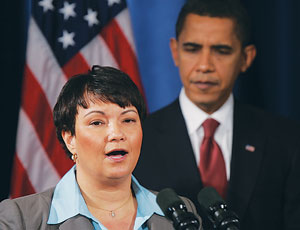President-elect Barack Obama has selected a veteran team of regulators and administrators to fill his administration’s top energy and environmental posts. Environmental and industry groups expect the team, announced on Dec. 15, to be more focused on climate change and renewable energy than the Bush administration. They believe the designees will be sympathetic to boosting funds for programs like Environmental Protection Agency water-infrastructure aid, but overall budget pressures may work against that.

For energy secretary, Obama tapped Steven Chu, who won the 1997 Nobel Prize in Physics and heads the Lawrence Berkeley National Laboratory. Lisa Jackson, former head of the New Jersey Dept. of Environmental Protection, is Obama’s pick to lead EPA.
He created a new slot, White House Energy Coordinator, and chose former EPA chief Carol Browner to fill it. Obama selected Nancy Sutley, a top energy adviser to former California Gov. Gray Davis (D), to chair the White House Council on Environmental Quality. “Over all, this is a very impressive group of individuals in terms of their credentials and their experience,” says Tim Williams, the Water Environment Federation’s managing director.
Williams says environmental and energy funding will likely be a critical challenge for the new administration. The new roster of cabinet-level officials probably may support more funds for accounts like Clean Water state revolving funds, Williams says. But with large sums expected to go for an economic stimulus package, “There is the government wide issue...of how much will really be available” for water programs, he says.
Eben Wyman, National Utility Contractors Association vice president for government relations, is hopeful Jackson will be an advocate for more funding for EPA water programs. “Compared to the current administration, we’ve got nowhere to go but up,” he says. He describes Jackson as a pragmatic administrator with a “record of building consensus,” between environmental and business groups, he says.
Chu, Obama’s choice to lead the Dept. of Energy, is widely recognized as a strong supporter of renewable and alternative energy sources. For construction, however, the main focus at DOE is its still massive effort to clean up former nuclear weapons facilities. That program received $5.4 billion in fiscal 2008.
Leo Duffy, who led DOE’s cleanup program in 1989-1993, says he has reservations that Chu is a scientist, rather than an engineer, at a time when a workable plan, not more research, is needed for cleaning up nuclear waste. Duffy believes “nuclear cleanup will take a back seat, with the exception of Hanford,” the Washington state site whose cleanup has strong congressional support.


Post a comment to this article
Report Abusive Comment